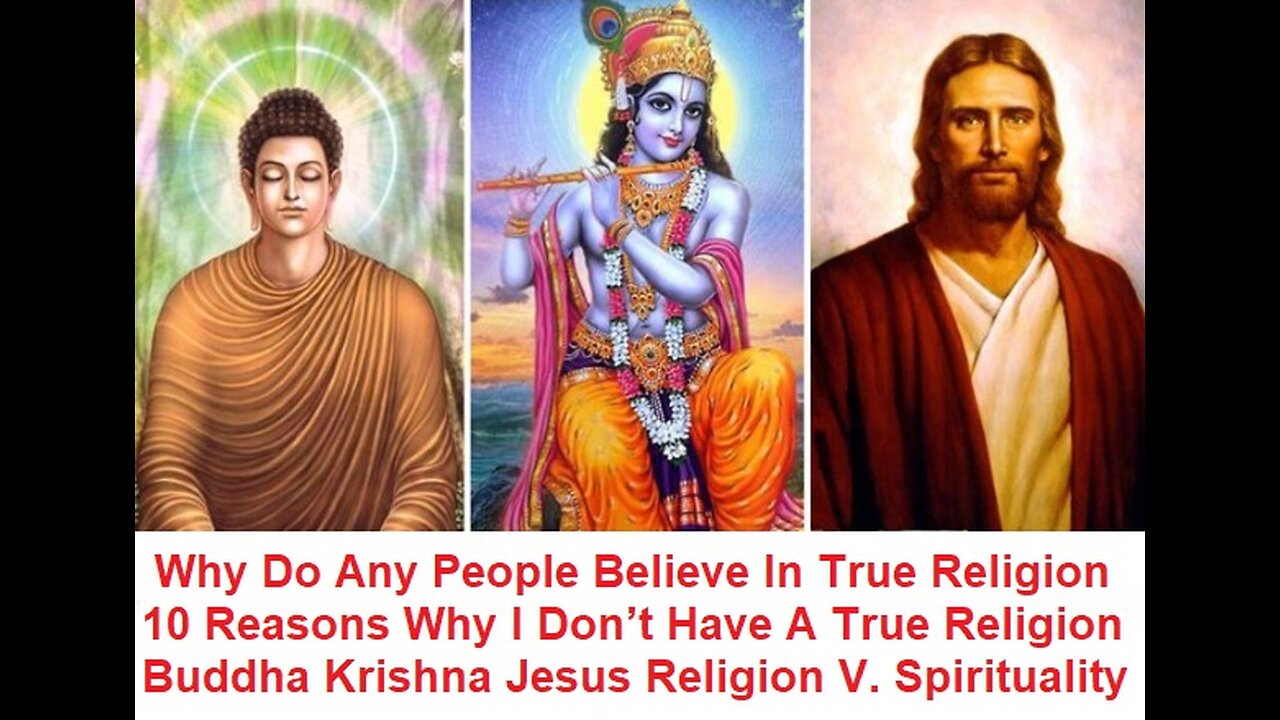Premium Only Content

Why Do People Believe In Religion & 10 Reasons Why I Don’t Have A True Religion
100 Things They Don't Want You To Know About The Bible And Other Books Dead Sea Scrolls, Gnostic Gospels, Book of Enoch, Gospel of Mary and Gospel of Thomas. Are True Religion Conspiracies, Mysteries And Unsolved Buddha-Krishna-Jesus Story And So Why Do People Believe In Religion At All ? & 10 Reasons Why I Don’t Have A True Religion Buddha-Krishna-Jesus Religion vs. Spirituality Who The True God's Now.
The Dead Sea Scrolls, also known as the Qumran Caves Scrolls, are a set of ancient Jewish manuscripts from the Second Temple period. They were discovered over a period of 10 years, between 1946 and 1956, at the Qumran Caves near Ein Feshkha in the West Bank, on the northern shore of the Dead Sea. The origin of the scrolls remains the subject of scholarly debate to this day. According to conventional theory, they are the work of a Jewish population that inhabited Qumran until Roman troops destroyed the settlement around A.D. The scrolls consist of more than 800 documents made of animal skin, papyrus, and even forged copper, and include parts of every book of the Hebrew canon, except the book of Esther. The scrolls have enabled scholars to push back the date of a stabilized Hebrew Bible to no later than 70 CE, to help reconstruct the history of Palestine from the 4th century BCE to 135 CE, and to cast new light on the emergence of Christianity and of rabbinic Judaism and on the relationship between early Christian and Jewish religious traditions.
The Gnostic Gospels are a collection of early Christian and Gnostic texts discovered in Nag Hammadi, Egypt in 1945. The texts include secret gospels, poems, and myths attributing to Jesus sayings and beliefs that are very different from the New Testament. Gnosticism proposed a revealed knowledge of God, held as a secret tradition of the apostles. The Gnostic Gospels were written by early Christian Gnostics who believed that they possessed the secret saving knowledge or information that Jesus had given to the apostles. They claimed these Gospels had apostolic authorship including Peter, Phillip, Thomas, and Judas. Scholar Elaine Pagels explores the mysteries and meanings of these sacred texts both in the world of the first Christians and in the context of Christianity today. While there are many Gnostic texts in the Nag Hammadi Library, not all of them share this perspective.
The Book of Enoch is a pseudepigraphal Jewish text that dates back to the second or third century BC. It is a compilation of several separate works, most of which are apocalyptic. While some parts might be older than the New Testament or even some parts of the Old Testament, it is for sure older than the compendium we know as the Bible. The Book of Enoch was not included by the Jews in their Tanahk (our Old Testament) because not even they considered it inspired sacred text. By the 5th century, the Book of Enoch was mostly excluded from Christian biblical canons, and it is now regarded as scripture only by the Ethiopian Orthodox Tewahedo Church and the Eritrean Orthodox Tewahedo Church. The Ethiopian Bible is nearly 800 years older than the King James Version and contains 81-88 books compared to 66. It includes the Book of Enoch, Esdras, Buruch, and all 3 Books of MACCABEE, and a host of others that was excommunicated from the KJV.
The Gospel of Mary is a non-canonical text discovered in 1896 in a fifth-century papyrus codex written in Sahidic Coptic. It is the only existing early Christian gospel written in the name of a woman. Unlike the controversial Jesus' Wife gospel fragment, it does not claim Mary was married to Jesus. However, it shows her to be an important disciple to whom Jesus' male disciples turn for advice and wisdom. The work contains a Gnostic version of New Testament events alleged to have taken place, particularly in association with Mary Magdalene. The collection in which the Gospel of Mary is found also includes three additional works: the Apocryphon of John, the Sophia of Jesus Christ, and the Acts of Peter.
The Gospel of Thomas, also known as the Coptic Gospel of Thomas, is an extra-canonical sayings gospel containing 114 secret sayings attributed to the resurrected Jesus. It was discovered near Nag Hammadi, Egypt, in December 1945 among a group of books known as the Nag Hammadi library. Scholars speculate that the works were buried in response to a letter from Bishop Athanasius declaring a strict canon of Christian scripture. The Gospel of Thomas is grounded in gnosticism, the philosophical and religious movement of the 2nd century ce that stressed the redemptive power of esoteric knowledge acquired by divine revelation. It does not include any extended mythic narrative and consists entirely of a series of secret sayings ascribed to Jesus. The sayings do not appear within a biographical narrative about Jesus, although some of them individually contain elements of dialogue or an abbreviated setting. The Infancy Gospel of Thomas is a biographical gospel about the childhood of Jesus, believed to date at the latest to the second century. It is generally considered to be Gnostic in origin because of references in letters (by Hippolytus of Rome and Origen.
In The Name Of Jesus ? Who ? Most Evil Christians In World King James Bible 1611.
In The Name Of Jesus ? Who ? Out of all the gangsters, serial killers, mass murderers, incompetent & crooked politicians, spies, traitors, and ultra left-wing kooks in all of American history,” asked a conservative and have you ever wondered who the worst of the worst In The Name Of Jesus ? Who ? and I was shocked to hear about John MacArthur, Voddie Baucham, Joel Osteen, TD Jakes, Steven Furtick, Joyce Meyer, Kenneth Copeland, Oprah Winfrey, Mike Todd, Andy Stanley, Hillsong Music, Carl Lentz, Bethel Music, Bill Johnson, Benny Hinn, Creflo Dollar, Jesse Duplantis, Paula White, Justin Peters, Paul Washer, Todd White, Brandan Robertson, Kathryn Krick, Todd Bentley, Sid Roth, Kat Kerr, Rob Bell, David Oyedepo, Rodney Howard Browne, Chris Oyakhilome, Shepherd Bushiri, Heidi Baker, Che Ahn, Lou Engle, Oral Roberts, and John Hagee.
Jesus,” which later employed the letter “J,” is a derivation It was not until 1630 that the differentiation became general in England.” Note in the original 1611 version of the King James Version of the Bible there was no “J” letter in this Bible for because it did not exist. James was spelled Iames. Jesus was spelled Iesous. The 80 books of the King James Version include 39 books of the Old Testament, 14 books of Apocrypha, and the 27 books of the New Testament.
The Letter “J” did not Exist - https://ia800703.us.archive.org/33/items/kjvkingjamesbibl1611lman/kjvkingjamesbibl1611lman.pdf - The Son of Elohim was not a White Guy with an English Name, speaking Greek
One of the most asked questions of the century. How can the Messiah’s Name be Jesus if the letter “J” did not exist 500 years ago?
The Messiah walked on earth about 2,000 years ago. If the letter and sound of “J” did not exist when the Messiah walked on this earth, what was His Name?
In the English Alphabet, the letter “J” was originally used for the letter “I”. The first to distinguish the difference between the letter “J” and the letter “I” was in Gian Giorgio’s 1524 “I” and “J” were originally the same letter but different shapes both equally the same letter.
According to the history of the English Alphabet, the official and original sound of the letter “J” was the sound of “Y” in “yet” or “yellow”.
The very first English-language book to make clear distinction between the sound of “I” and the sound of “J” was not written until 1634. It wasn’t until then, after the 1611 Bible was published, that the English language officially accepted the shape and sound of the letter “J” as “jay” and no longer the “yuh” “Y” sound.
Jehovah or Jesus are Man made Names, with Man Made Doctrines. Tricked, Bait & Switch. Now after Reading this Post, you are No Longer Tricked. From this Point on you’re making a Choice who to follow.
A Savior Created by the Church of Constantine the Great; “Let us then have nothing in common with the detestable Jewish crowd; for we have received from our Savior a different way.”
This is not the Savior Yahu’sha, this is a different one, that is followed a different way, his name is Jesus. The one we are warned would came in His name, the one told you would accept, while you reject the True Master. We were Warned and we Can see just how True it is.
King James 1566-1625 The Black King Who Had The Bible Translated Into English
King James, was the 1st King of England born 1566-1625 and he was the first to rule Scotland and Northern Island at the same time. In 1603 he commissioned a scholars to have the bible translated into English and make it available to all English speaking people throughout the world. It’s a little known fact that he was a Black man who ruled these countries in Europe. During his time he was though to be one of if not the greatest leader of his time. King James, a Black Man.
King James I of England and VI of Scotland, 1619. James (1566-1625) acceded to the Scottish throne in 1567, and to the English throne in 1603 on the death of Elizabeth I. He was the son of Mary, Queen of Scots and Henry, Lord Darnley. James, an educated and able king, desired to bring peace to war-torn Europe. He is probably best remembered for commissioning an English translation of the bible, published in 1611, and still known as the King James Bible.
Historical Context Facts about the Slave Trade and Slavery. King James 1566-1625 So Black King Who Had The Bible Translated Into English also Signed The First Charter for the New World in 1619 Black Slave Trade and Slavery. (Yes a Black Man and King)
The Middle Passage was dangerous and horrific. The sexes were separated; men, women, and children were kept naked, packed close together; and the men were chained for long periods. About 12 percent of those who embarked did not survive the voyage.
Well over 90 percent of enslaved Africans were sent to the Caribbean and South America. Only about 6 percent of African captives were sent directly to British North America. Yet by 1825, the US population included about one-quarter of the people of African descent in the Western Hemisphere.
The 1619 Project (Slave Trade and Slavery. Black King James 1566-1625) is a long-form journalism endeavor developed by Nikole Hannah-Jones, writers from The New York Times, and The New York Times Magazine which "aims to reframe the country's history by placing the consequences of slavery and the contributions of Black Americans at the very center of the United States' national narrative.
Black Kings and Queens the Rulers of England From 1603/1901 Historians Never Talk?
So Moorish and Black Kings and Queens the Rulers of England and Europe From 1603/1901 You may have heard of these England and European Emperors, Kings and Queens, but did you know that they were Black ? So England /American after 1776? So Slavery Trade began 400 years ago this month. Started by Black King James I and VI of Scotland 1603 -1625 signed into law by this king ? This is referred to as the country’s original sin, but it is more than that It is the country’s true origin. Ancient Europe is not what we've been taught. Many things have been whitewashed, especially its ancient History. Here are some facts that you probably didn't know. President Abraham Lincoln, the Melungeon or Tawny Moor was the President of the United States. As President, he has to balance the Moorish side and the European side.
New Age beliefs are modern deceptions
New Age claim to respect the Bible but contradict It
We live in a confusing age. There are about 45000 different types of Christian denominations and churches today. Some of these go under the heading of "New Age". Some New Age beliefs encourage a person to elevate himself or herself to the level of a god. Then they worship themselves for being their own creator. They focus on an exaggerated sense of self-importance to justify their self-admiration. They feel that there is a god-self within themselves. This kind of thinking easily catches on in our modern world of "selfies". Many pagan religions had their myths and legends about a virgin birth but none could turn it into a physical reality.
What Is Religion ? The Psychology of Why People Believe In Religion & 10 Reasons Why I Don’t Have A True Religion. By far the most frequent question I’m being asked by readers is whether I have a religion.
Why’s that?
I’m not quite sure, to be honest. Perhaps it’s because of the name of my blog. Or maybe because of the content of my writing. Or possibly because of the reddish brown Jesus-like beard that I’m sporting.
In any case, I decided to write this article so that whenever people ask me this question again, I can simply send them to this post, instead of having to give them each time a new yet nearly identical in meaning answer.
As you must have already figured out from the title, I don’t have a religion. But before I proceed to telling you my reasons for that, I’d like to clarify a few things so as to minimize the possibility of being misunderstood.
Firstly, although I don’t have a religion, that doesn’t mean I don’t like people who do have one or I think they’re bad or stupid. I’ve known quite many religious people who’re smart, kind-hearted and brilliant in all sorts of ways. So if you consider yourself religious, please don’t take my words personally — I don’t intend to degrade or offend you or anyone else who holds religion dear to their heart.
Secondly, my aim here isn’t to ridicule religions or imply that they have nothing important to offer. For the last fifteen years of my life I’ve devoured tons of books on religion, and from my readings I have discovered that all the major religions contain kernels of wisdom. I know that religion is a very touchy topic, so again don’t take what I am about to say as a personal attack. I’m just sharing my thoughts here.
Lastly, I’m not trying to show that all religions are fundamentally the same. I’m well aware that religions are very different, even contradicting to each other, and like most people I value some religions more than others (for example, I value Buddhism over Hinduism and Hinduism over Christianity). In this article, my critique is by and large pointed towards the dominant, fundamentalist, Western religions of the world, which, although dissimilar to one another, share some core ideological commonalities that, as I’ll explain, are not only extremely unreasonable but also tremendously harmful. Hence, I feel a sense of personal responsibility to talk about them openly here, and possibly help a few people to escape from (or avoid falling into) their trap.
OK, now that I’ve made myself clear, here are the ten main reasons why I don’t have a religion:
1. Because I consider sex as one of the most sacred things in life.
Have you ever wondered why the vast majority of religions are against sex? We were all born out of the sexual act, and without sex we wouldn’t even exist. So how can sex be something bad? It is the source of life! Hence, in my view being anti-sex essentially means being anti-life.
In some religions, such as Judaism, Christianity and Islam, sex is allowed only for reasons of procreation. In other words, you can have sex to bring new babies into existence, but you can’t have sex just for the sheer joy of it. If you or your partner happens to be wearing a condom during sexual intercourse, you’re both deemed to be sinners, and just because of that there’s an extremely high chance that you’ll be thrown to hellfire right after the moment you take your last breath.
One of the most beautiful experiences in life — that of orgasmic union with a beloved partner — is accused of being one of the most (if not THE most) despicable things in life. As a result, so many people who live by religious dogmas are being deprived of it.
Considering sex bad, wrong or evil, dogmatic religious people tend avoid it like the plague and do whatever it takes to suppress their sexual feelings. But suppression, as any psychologist would tell you, is a sure-fire way to perversion. No wonder they usually develop unhealthy mental and behavioral patterns that can harm (sometimes seriously) themselves and those around them.
2. Because I don’t subscribe to the notion of total “free will”.
To the ego, that’s a tough truth to admit, but it’s a truth nonetheless.
The concept of total “free will” is just a myth that was made up a long long time ago by theologians in order to explain that God is right to reward those who follow his orders and punish the ones who don’t.
Think about this: If we didn’t have the freedom to choose, which loving, all-knowing God would reward/punish us for our choices? Only an imbecile/sadistic one.
The theory of 100% “free will” justifies God punishing and rewarding people, who are free to choose as they will, regardless of biological, psychological and social pressures. This theory, however, has absolutely no scientific basis.
The truth is that, although we do make choices, those aren’t entirely free. That’s because our choices are the result of a combination of biological, psychological and environmental/societal components that make up who we are, and which are mostly out of our control. In other words, your conscious, rational choices can’t be decoupled from the unconscious processes of your mind or genetic, social and environmental factors.
If, for example, you were born and raised in a Hindu family in India, you’d most likely be a Hindu yourself, or at least you’d have acquired Hindu values. It’s not that you consciously chose to be a Hindu — on the contrary, we can say that Hinduism chose you. But a Christian would likely say that you chose to be a Hindu, and for that you deserve to burn in everlasting hellfire (unless you repent of your sin).
Or, to give you another example, think of a person who’s addicted to drugs and lives in the streets begging for food and money. If that person possesses complete free will, then he obviously has chosen this kind of lifestyle, right?
Sadly, this is what people who subscribe to the ideology of total “free will” think. “He’s a moral failure.” “He’s just too lazy to work.” Yeah right, that’s exactly the case when you ignore the traumatic experiences that led him to develop an addiction as well as the socioeconomic conditions that deprived him of a decent life.
3. Because I don’t believe in Heaven and Hell (at least not as they’re commonly understood).
Here in the West, there are two main reasons why people believe in religions.
The first one is the fear of hell. From the moment we’re born religions are trying hard to make us believe that if we don’t act as we’re prescribed by the scriptures, we’ll end up in serious trouble. In fact, quite possibly in eternal trouble — namely, hell. Afraid of being thrown into hellfire, people start believing all sorts of things that religion tells them, regardless of how unreasonable those might be.
The second main reason why people believe in religions is the desire for heaven. Each religion tells us that if we live according to its dogma, we’ll be rewarded with some kind of everlasting heaven. And many of us are willing to sacrifice our lives so that we can enjoy ourselves in the afterlife. For example, religion tells us: “Don’t have sex now, and you’ll have the best sex ever in heaven.” (Fun fact: Did you know that in the Islamic tradition men in heaven are said to be rewarded with eternal erections and eternally young (and, of course, non-menstruating) female virgins with swelling, pears-shaped breasts? I know, it sounds far-fetched, but the scriptures can’t be wrong, right?)
To me, that’s total nonsense. Hence, I don’t believe in the notion of heaven and hell as propounded by most religions. I could only accept heaven and hell as symbols representing states of our consciousness. For example, when we are hateful and agitated, we experience a state of hell. On the contrary, when we’re loving and peaceful, we experience a state of heaven. But that isn’t as fancy as religious people would like heaven and hell to be.
4. Because I view animals as sentient beings worthy of love and respect.
According to the Abrahamic religions (and plenty of others), God created animals for one basic reason: So that people can exploit them. In the view of those religions, animals don’t have a soul — in other words, they are non-sentient beings. They are just pieces of meat put together, functioning like machines and being unable to experience happiness and sadness, pleasure and pain.
Not surprisingly, a lot of people who subscribe to those religions tend not to care much about animal justice and welfare — except, perhaps, when it comes to “their” pets. In general, they have no problem exploiting or even killing animals (whether directly or indirectly). This is quite obvious, for example, by the fact that they tend to unnecessarily consume animal products — that is, products that are the result of exploitation, abuse and often murder — without feeling any regrets. “If animals have no soul and God has created them for us to use,” many religious people think, “there’s absolutely no problem in exploiting or depriving them of their life.”
Of course, as any sensible persons knows, animals aren’t machines. Just like us (non-human animals), they have subjective experience, a rich and complex emotional world, and the desire to live and avoid pain. If you don’t believe me, just ask any zoologist and I’m pretty sure he/she will tell you the same. So instead of using animals as soulless objects, why don’t we start treating them as living beings deserving of compassion and respect?
If you’re consuming animal products, here’s a video I made a couple of years ago showing what animals are usually forced to go through before they end up on your plate. Additionally, you might want to read this article that refutes the most common arguments people have against giving up animal-derived food products.
Other than not eating animal products, there are various ways to minimize human-imposed animal suffering — such as not consuming wool, leather, and fur — but adopting a plant-based diet is a great (and, if you ask me, the most effective) place to start.
5. Because I consider all people, regardless of their race, sex, gender, class or religious ideology as equal.
What the vast majority of religions around the world have done is divide people according to the race, sex, gender, class and religion — among other things — they belong. Let me give you a few examples:
In India, there’s a social stratification class system based on Hindu ideology that goes back in ancient times, which divides people into a hierarchy of social classes called “castes”, where the higher classes have the “birthright” to oppress the ones below them.
In Buddhism, for centuries women were considered unable to reach the blissful heights of consciousness that men can, and because of that they weren’t allowed to become Buddhist nuns and pursue enlightenment.
Christianity looks down on homosexuals, believing that they are victims/worshippers/devotees of the devil, and hence condemns them to hell.
According to Islam, atheists are one of the worst kind of sinners and in certain Arabic countries where Islamic faith is very strong, they are even punished by death.
Again, these are only a few examples among countless others. (In case you don’t believe me, just read for yourself the scriptures of the dominant religions of the world and you’ll see exactly what I mean.)
To me, all people deserve equal opportunities in life and shouldn’t be discriminated based on superficial differences such as the ones I just mentioned. Hence, if we want to see a world where people are allowed the freedom to be who they are and do what they want (provided, of course, that they don’t harm others), then we need to do away with obsolete religious values that breed oppression and inequality.
6. Because I don’t want to accept “truths” there’s no viable evidence for.
In my life I’ve heard countless reasons why people should adopt religion, but I’ve not yet found any reason that’s convincing. On the contrary, I’ve found them to be nonsensical and, in most cases, appalling.
Dogmatic religions require people to accept and believe in all sorts of “truths”, no matter how illogical, unscientific or plain silly they are. For example, some religious people believe that God is floating somewhere in space and can see and know all that’s going on in every single person’s life. They also believe that a virgin woman was impregnated by a ghost (after God told him/it so) and that she later on gave birth to the very son of God. They even believe that God wants male children to have a piece of flesh chopped off from their penis (i.e. the foreskin) so they can prove their love to him.
I could go on forever giving you similar examples, but you get the idea.
Just because religions claim something to be true or right, and that something has been accepted by people for hundreds or even thousands of years, doesn’t make it true or right. And, considering that nearly every religion claims to be the only right one, which religion (of the thousands that exist in this day and age) should one follow? I don’t know about you, but I choose not to follow any religion whatsoever.
7. Because I prefer to stay open-minded (but not so much that my brain falls out).
People who fervently believe in religions can’t think outside the box of their religious ideology. They become attached to a particular belief system, which prevents them from changing their mind when presented with information that contradicts their religious beliefs. In other words, their mind is locked in an ideological cage from which they won’t escape as long as they don’t doubt and thoroughly examine their beliefs.
I want to be a freethinker and not a prisoner to any belief system, so I choose not to identify myself with any religious ideology. As I mentioned in the introduction of this article, I do enjoy reading religious scriptures (including the Bible, the Dhammapada and the Bhagavad Gita) and have found profound wisdom in many of them that has helped me to live a more meaningful and fulfilling life. At the same time, however, I’ve also found in them tons of bullshit information and utterly abhorrent advice which I totally reject and make sure not to apply in my life.
In short, I keep an open mind to receive new information but I make sure to examine it thoroughly in order to reach my own conclusions (instead of accepting it on belief alone (as religious people tend to do).
8. Because I don’t like to be obey or command anyone.
Organized, dogmatic religions tell people to obey a set of rules. And if they don’t, they’re warned that they’ll be punished for that.
“Here are the Ten Commandments — follow them or else you’re going to burn in hell!”
In other words, religion manipulates people by instilling fear in them. Priests, gurus and all so-called religious teachers who’re power-hungry know this extremely well. Hence, they exploit people’s insecurities in order to control and benefit from them, whether financially or otherwise.
To me, growth and wisdom are derived from our personal experiences and understanding, and not from blindly following scriptures or obeying authority figures. Therefore, I don’t like to have others tell me how I should live, just like I don’t like to tell others how they should live.
9. Because I don’t want to experience chronic shame.
From a very early age, most religions try to brainwash us into believing that we’re not good enough as we are and that we should strive to be very different.
Christianity, for example, teaches us that we are sinners by birth, and that should die to our sinful selves if we wish to be accepted by God and go to heaven in the afterlife. And this, of course, can be accomplished only if we completely surrender to the will of God and fully obey the dogmas found in the Bible.
According to Christianity, it’s a sin to trust our heart, mind, and gut instinct. Not surprisingly, we’ve been disconnected from our emotional world and haven’t developed the capacity to think critically. We blindly follow scriptures, but we’ve lost touch with our inner voice.
But the problem gets even worse: When we think or feel something other than what God supposedly wants us to, we feel bad about ourselves. We feel that we’ve gone against God and that he’ll punish us for our sins. We feel ashamed and unworthy of love, respect and compassion. We even feel hatred toward ourselves.
So why I would I want to feel this way about myself? Although I know very well that I am far from perfect, and that there’s plenty of space within me for self-improvement, I also know that the key to finding inner peace and contentment is to fully accept myself, regardless of my flaws or imperfections.
10. Because I see humanity as one family, and want to live at peace with my brothers and sisters.
It is often claimed that religion brings people together by preaching peace and love. But does it really? In my experience, the opposite is the case, at least when it comes to most of the dominant religions of the world.
Here’s why: Most religions distinguish people between good and evil. According to each of those religions, the good people are always those who are faithful to them, whereas the evil ones are those who don’t.
But when you see other people as evil (and that merely because of the religion they adhere to), how can you love and live at peace of them? You can’t. Rather, you want to protect yourself from them. And many times, the best way to protect yourself appears to be fighting against them. That’s exactly why people of different religious groups have been constantly fighting against each other for thousands upon thousands of years.
I want to see people living in peace. For that to happen, however, we need to stop dehumanizing our fellow humans and start seeing our species as a single family that shares the same home (i.e., the Earth). In other words, we need to stop fighting and start loving each other.
Religions, as we know them, are obsolete and sooner or later will (hopefully) disappear. Then, a new “religion” will emerge — that of genuine love, trust, respect, care and compassion.
What Is Religion?
The Psychology of Why People Believe and Religion is a set of organized beliefs, practices, and systems that most often relate to the belief and worship of a controlling force, such as a personal god or another supernatural being.
Religion often involves cultural beliefs, worldviews, texts, prophecies, revelations, and morals that have spiritual meaning to members of the particular faith, and it can encompass a range of practices, including sermons, rituals, prayer, meditation, holy places, symbols, trances, and feasts.
While this is a basic definition, there are many different understandings of what religion is. Not all religions are centered on a belief in a god, gods, or supernatural forces.
The famed psychoanalyst Sigmund Freud described religion as a form of wish fulfillment. However, modern psychology recognizes that religion can play an important role in an individual's life and experiences and can even improve health and well-being. In fact, studies have shown that religion can help people develop healthy habits, regulate their behaviors, and understand their emotions—all factors that can affect your health.
According to an estimate by the Pew Research Center, 84% of the world's population has some type of religious affiliation.
Types of Religion
There are many different types of religions, including the major world religious traditions that are widely known as well as much lesser-known belief systems of smaller populations. Some of these represent monotheism, or the belief in a single god, while others are examples of polytheism, or the belief in multiple gods.
Some of the types of religions include but are certainly not limited to:
Baha'i - Buddhism - Christianity - Confucianism - Hinduism - Indigenous American religions - Islam - Jainism - Judaism - Rastafarianism - Shinto
- Sikhism - Taoism - Traditional African religions - Zoroastrianism
Related to religion, animism is the belief in divine non-human beings, while totemism involves the belief in a divine connection between humans and the natural world. On the other end of the religious spectrum is atheism, which involves a belief in no god or gods, and agnosticism, which holds that the existence of god or gods is unknown or unknowable.
Religion vs. Spirituality
While religion and spirituality are related, there are differences between the two. Spirituality is an individual practice and belief, whereas religion is centered on a set of organized practices that a larger group shares. It is possible to be spiritual without being religious.
Why People Believe in Religion
The reasons why people believe in religion are not fully understood, but researchers have suggested a number of possible explanations.
The Psychology of Religious Belief
According to the most recent Gallup poll, 47% of adults in the U.S. have some type of religious membership. As to why people believe in religion, psychologists have proposed several theories.
While Freud believed that religious belief was a form of pathological wish fulfillment, other researchers have proposed that how the human brain works often predisposes people to believe. The human mind looks for patterns, purpose, and meaning, which may influence why people turn to religion to guide their belief systems.
Parenting and cultural influences also play an important role since people tend to belong to the religion in which they were raised. The human need to belong, combined with the desire for social connection, also contributes to the desire to be part of someone larger than the self.
The Purpose of Religion
Religion can serve a wide range of purposes. Religion can be a source of comfort and guidance. It can provide a basis for moral beliefs and behaviors. It can also provide a sense of community and connection to tradition. Some research even suggests that it may affect health.
The impact of religion on health and life expectancy has always been a tricky area of research. It seems (to some) that religious people—defined here as people who attend religious services regularly—seem to be healthier than those who don't attend.
This has led to a line of research looking into the impact of religion on health to determine what, if any, positive benefit religion could have on life expectancy. This research is tricky, however, because of several factors that are difficult to control for, including:
People who attend religious services may simply be healthier than those who cannot attend.
The benefits may have more to do with social contact than religion itself.
Certain religions may encourage healthy behaviors.
As researchers look into the impact of religion, all these factors must be considered along with the possibility that religion itself influences health.
Impact of Religion
Religion can contribute to a sense of community, provide support, and offer guidance. It has also been shown to impact both physical and mental health.
Religion and Physical Health
One series of studies found that participants who were either religious or spiritual had a decreased risk of coronary heart disease (CHD), lower blood pressure (BP), better immune function, and longer lifespans when compared to people who were not religious or spiritual.
Researchers found that the participants who were religious or spiritual tended to eat more nutritious diets, engage in more physical exercise, and have better cognitive function compared to people who were not religious or spiritual.
In these studies, people who were religious were also less likely to smoke, which put them at a lower risk of smoking-related illnesses such as all cancers, cardiovascular disease, and lung disease. Maintaining a healthy lifestyle is linked with a better quality of life as well as a greater lifespan.
Religion and Mental Health
Religion can also influence mental health in both positive and negative ways. Religion can serve as a source of comfort and strength when people are under stress. At other times, this connection may be less helpful—or even harmful—if it creates stress or acts as a barrier to treatment.
Studies suggest that religion has both the potential to help and harm mental health and well-being. On the positive side, religion and spirituality can help promote positive beliefs, foster community support, and provide positive coping skills. On the other hand, negative religious coping, miscommunication, and harmful negative beliefs that actually be detrimental to mental health.
Key Mental Health Benefits
Some mental health benefits of religion include:
Giving people structure
Building a community with a group
Creating a sense of belonging
Helping people cope with stressful events
Can encourage forgiveness, compassion, and gratitude
Religion can also play a role in helping people cope with mental health conditions. People often turn to their religious beliefs in order to cope with symptoms of mental illness and to help manage stress.
Research has also shown that religious people often first turn to religious clergy when they need treatment for mental health conditions. Religious and pastoral counseling can be an important resource for people of faith who want to incorporate their religious and spiritual beliefs into their treatment. Twelve-step addiction treatment programs such as Alcoholics Anonymous (A.A.) also sometimes take a faith-based approach to treatment.
Pastoral counseling is provided by religious clergy who have been psychologically trained to provide therapy services. These counselors integrate modern psychological practices with theological teaching to address problems that their clients are experiencing.
Is Religion Good or Bad for People?
There's no doubt that religion has a complex influence on the lives of individuals and societies. Religion can help bring people together, but it can also be a source of division and stress, particularly for those who face discrimination within religious communities, such as people who hold differing beliefs from the rest of the group.
Research has also found that people who struggle with their religious beliefs may experience lower well-being and higher levels of anxiety and depression. Specific religious beliefs can also play a part in the potential benefits or drawbacks. People who believe in a merciful God are more likely to forgive themselves and treat their mistakes with self-compassion. In contrast, those who believe in a punishing or judge mental God may experience worsened health effects.
Given the potential benefits linked to religious affiliation, some may wonder if it might be a bad thing not to be religious. While studies suggest that religion may have health benefits, you don't need to ascribe to a set of organized religious beliefs to reap these rewards. Taking steps to engage in healthy behaviors, form social connections with others, and strengthen your coping skills are steps you can take to obtain those benefits that religion often provides.
If you are concerned about religion's impact on your life, discussing your concerns with a mental health professional may be helpful. Research suggests that religion can play a positive and supportive role in people's lives in many ways. For some individuals who feel less supported or even excluded from religious practice, it is important to weigh the potential good with the potential harm.
How Spirituality Can Benefit Mental and Physical Health
Tips
If you are interested in exploring some of the potential benefits of religion or spiritual traditions, there are some things that may help:
Find a community that you connect with. Social support is an important part of well-being, so feeling a sense of connection with others in your religion can be beneficial.
Explore practices often utilized by religion. Meditation and mindfulness have been shown to have a number of wellness benefits.
Search for things that inspire you. Whether it is reading inspirational books, listening to beautiful music, or spending time enjoying nature, finding things that give you a sense of peace and inspiration can help improve your mental clarity and well-being.
The observation is real: People who attend religious services regularly tend to live longer and often experience better mental well-being. The tough question to answer is, why?
It may simply be that people who attend religious services tend to have more social and financial resources than non-attendees, or it could be that something about attending religious services (like making connections with others, prayer, or spiritual reflection) helps people to live longer and feel better. You'll have to decide for yourself.
Potential Pitfalls
Because these studies are observational (researchers watch what happens in the real world without actively controlling any of the conditions or randomizing the participants), it cannot be said with certainty that religious attendance increases life expectancy or that it doesn't.
We can only conclude that there is an association between religious attendance and increased life expectancy. They are linked, but we don't know why.
There could be a different reason to explain the life expectancy outcome in the study. In fact, other studies have shown that people who regularly attend religious services:
May be more likely to be employed
Tend to have larger social networks
Tend to be more positive
Are more likely to live in intact families
Are less likely to be experiencing disabling illness
Any of these factors could explain the difference in life expectancy observed in these studies. Another study suggested that religious involvement on its own should not be automatically assumed to improve health. People who share religious beliefs also usually share other characteristics including ethnic, cultural, and socioeconomic backgrounds.
Research also suggests that religion can sometimes become a barrier to mental health treatment. Religious attitudes toward mental health and treatment can play a role in whether people seek help when they are experiencing symptoms.
Some religious traditions instill the idea that problems are moral or spiritual failings rather than mental health issues.
According to this perspective, mental problems can be overcome simply through willpower or "heroic striving." Because of this, people from such backgrounds may simply be less likely to seek professional help and support when they are having mental health problems.
Real Timeline Of Deception Part 0 Exploring Tartaria 1000 Years
Exploring Tartaria - Old World Secrets Revealed
https://rumble.com/v2u8ef4-real-timeline-of-deception-part-0-exploring-tartaria-1000-years-added-to-ou.html
Real Timeline Of Deception Part 1 Exploring Tartaria 1000 Years
The Timeline Deception - Part I - Exploring Tartaria
https://rumble.com/v2ua8sa-real-timeline-of-deception-part-1-exploring-tartaria-1000-years-added-to-ou.html
Real Timeline Of Deception Part 2 Exploring Tartaria 1000 Years
The Timeline Deception - Part II - Exploring Tartaria
https://rumble.com/v2ubf4w-real-timeline-of-deception-part-2-exploring-tartaria-1000-years-added-to-ou.html
Real Timeline Of Deception Part 3 Exploring Tartaria 1000 Years
The King of Tartaria - Exploring Tartaria
https://rumble.com/v2ueih6-real-timeline-of-deception-part-3-exploring-tartaria-1000-years-added-to-ou.html
Real Timeline Of Deception Part 4 Exploring Tartaria 1000 Years
The Saints - Relics, Reliquaries, & The First Resurrection
https://rumble.com/v2ugl92-real-timeline-of-deception-part-4-exploring-tartaria-1000-years-added-to-ou.html
Real Timeline Of Deception Part 5 Exploring Tartaria 1000 Years
The Saints - The Ruling Class - Exploring Tartaria
https://rumble.com/v2uij7w-real-timeline-of-deception-part-5-exploring-tartaria-1000-years-added-to-ou.html
Real Timeline Of Deception Part 6 Exploring Tartaria 1000 Years
From Atheism, Agnosticism, New Age, Protestantism, to Roman Catholicism
https://rumble.com/v2ujvr6-real-timeline-of-deception-part-6-exploring-tartaria-1000-years-added-to-ou.html
Real Timeline Of Deception Part 7 Exploring Tartaria 1000 Years
The Millennial Kingdom of God - Exploring Tartaria
https://rumble.com/v2uldss-real-timeline-of-deception-part-7-exploring-tartaria-1000-years-added-to-ou.html
Real Timeline Of Deception Part 8 Exploring Tartaria 1000 Years
Magic of the White City 1893 Chicago World's Fair
https://rumble.com/v2un20g-real-timeline-of-deception-part-8-exploring-tartaria-1000-years-added-to-ou.html
Real Timeline Of Deception Part 9 Exploring Tartaria 1000 Years
1000 Years Added To Our History & Dark Ages Never Existed
https://rumble.com/v2uo07i-real-timeline-of-deception-part-9-exploring-tartaria-1000-years-added-to-ou.html
Real Timeline Of Deception Part 10 Exploring Tartaria 1000 Years
Church History - Complete Documentary AD 33 to Present
https://rumble.com/v2uprfu-real-timeline-of-deception-part-10-exploring-tartaria-1000-years-added-to-o.html
Real Timeline Of Deception Part 11 Exploring Tartaria 1000 Years
Christmas Unveiled - Pied Piper - Templars Secret - Saturn's Workshop - Giants Stealing Children
https://rumble.com/v2urmd0-real-timeline-of-deception-part-11-exploring-tartaria-1000-years-added-to-o.html
Real Timeline Of Deception Part 12 Exploring Tartaria 1000 Years
Ancient Cloning Factories - Foundlings - Incubators - Test-Tube Babies
https://rumble.com/v2uu8ck-real-timeline-of-deception-part-12-exploring-tartaria-1000-years-added-to-o.html
Real Timeline Of Deception Part 13 Exploring Tartaria 1000 Years
Homunculus Unveiled - Jesus - Artificial Generation - Liber Vaccae - Lost Esoteric Secrets
Archaix Chronology Anunnaki Sumerian Gods Crystalinks Timelines 2040B.C. 2046A.D.
Archaix 2.0 Doomsday Chronology Five color charts with extensive Legend-chronology; exhibits 62 dates involving 300 events in linear timeline combining the Phoenix and Nemesis X Object appearances, the Mayan Long-Count baktuns and the Anunnaki NER 600 year periods, a history spanning over 74 centuries to May 2040 and November 2046.
The Lost History of Earth (Ewaranon) W0W - A Must See Video Lost Earth
Everything we were taught about the Earth, History, Science, Space, Energy and our Civilization was a lie. This mind blowing documentary will shift your perspective of the world monumentally.
The Secret Life of Symbols with Jordan Maxwell Knowledge of the Heavens, Life on Earth
Ancient Religions From Alpha To Stone Age To Omega To Modern Times To Infinity
This 11.5 Hrs. Full Documentary With Sound Is About Ancient Religions From Alpha To Stone Age To Omega To Modern Times To Infinity.
https://sacred-texts.com/cla/sib/sib.pdf
Religious Abuse: Spotting the Signs and How to Cope Religious abuse, also referred to as spiritual abuse, is a type of abuse that occurs within religious or spiritual communities. This can range from a religious leader shaming a member based on their sexuality to abusing a congregation member.
Additionally, religious abuse can occur at the hands of family members, friends, and partners. For instance, a partner may prevent their spouse from practicing their own or use religious doctrine to justify their abuse against them.
No one deserves to be abused and mistreated. We often think about abuse happening in the home and romantic relationships. However, religious abuse is a common issue that is not often talked about which can result in long-lasting trauma.
When going through a hard time, people often turn to religion. For instance, it can feel comforting to rely on or speak to a higher power when you may need guidance. However, since most people are vulnerable when they're in pain, this vulnerability can be weaponized by leaders and peers alike in religious communities.
This article will define religious abuse, help you identify types and signs of this abuse, and provide information on how to get help.
Understanding Abuse and an Abuse of Power
First, let’s start with understanding what abuse is. Abuse refers to "a corrupt practice or custom," "to use or treat to injure or damage," and "to put to a wrong or improper use."
It's also important to note that any form of abuse can happen in any religious or spiritual institution. Moreover, anyone from any religion or spiritual belief system can perpetrate this abuse.
An Abuse of Power
The most common abuse in religious institutions is an abuse of power, which leads to many forms of abuse. This abuse can present as sexual, emotional, financial, physical or verbal harm.
Abuse of Power & Religious Doctrine
An abuse of power refers to actions perpetrated by someone against another person to influence or control them in some way. The perpetrator will be of higher status (i.e., older, in a higher work position) and can use their position of power to harm another person.
When it comes to religious abuse, people can view this type of abuse as "religious doctrine." Religious doctrine refers to a set of beliefs and/or practices that people belonging to a religion follow. If abuse is excused in the name of religious doctrine, it can lead people to overlook, normalize, or dismiss abuse.
What Are Examples of Religious Abuse?
There may be various forms of abuse that occurs within a religious or spiritual setting:
Abuse may be linked to one’s social identity (e.g., sexual orientation,
Super JT, Jacobson L. Religious abuse: implications for counseling lesbian, gay, bisexual, and transgender individuals. - gender, race) - Physical - Verbal
- Emotional/mental - Sexual - Financial Signs of Religious Abuse
Spotting the signs of abuse is essential to staying safe. First, let’s explore the general indicators of an abusive relationship.
Control and Manipulation
A sign of an abusive relationship consists of subtle forms of control (this could come in the form of gaslighting). Perhaps the abusive individual has strong opinions about the people you spend time with. For instance, religious institutions that push members into spending their time in specific ways and label people who don't abide by the rules as sinners or not being people of faith.
They could get angry if you don’t tell them what you’re doing. They might even insult you based on an outfit you’re wearing. This behavior can escalate, resulting in manipulation, sexual coercion, and physical assault.6
Behavior like this can escalate gradually, which makes it difficult for members to identify what is happening as abusive.
Power Dynamics Are Present
Now, let’s consider how these signs of abuse may present in a religious context. There may be members of the church who hold a lot of power, like a preacher or bishop. Power dynamics can lead to abuse such as: - Sexual coercion - Financial abuse - Instilling fear
This power can be abused by telling church members that they will be excommunicated unless they provide a sexual favor.
One could be pressured into constantly donating money to their religious institution. Whenever they question the reasoning, a religious leader could begin manipulating them into thinking they are failing God.
In other circumstances, someone may continually tell someone they’re disobeying God and going to Hell whenever they set boundaries.7
Red Flags
Red flags to keep an eye out for include a religious leader using scripture to embarrass or shame you, touching that makes you feel uncomfortable, and insistence on generous financial donations.
Impact of Religious Abuse
All forms of abuse lead to trauma. However, when abuse occurs in a religious context, the trauma isn’t only related to the harm caused. Some may find themselves disconnected from their faith, making it impossible to use their spirituality as a coping tool.
Faith Is Shattered
In turn, this can create further despair and trauma. Abuse in a religious context can rob survivors of their well-being, relationships, and belief system.
The impact of abuse as a whole can be devastating. For example, those who experience abuse as children are more likely to develop issues with substance abuse, severe physical illnesses, and adverse mental health outcomes.
Others who experience domestic violence face similar outcomes, particularly compromised mental and physical health and decreased productivity, leading to economic insecurity.
How to Get Help
Healing is possible. Whether you feel you may have experienced religious abuse or sense that someone you love has been victimized, below are a few helplines that you can get in contact with.
Hotlines You Can Contact
Child Abuse: If you are a victim of child abuse or know someone who might be, call or text the Childhelp National Child Abuse Hotline at 1-800-422-4453 to speak with a professional crisis counselor.
Domestic Violence: If you or a loved one are a victim of domestic violence, contact the National Domestic Violence Hotline at 1-800-799-7233 for confidential assistance from trained advocates.
Sexual Assault: If you are a survivor of sexual assault, you can contact the RAINN National Sexual Assault Hotline at 1-800-656-4673 to receive confidential support from a trained staff member at a local RAINN affiliate.
LGBTQIA+: If you are seeking support for issues with coming out, relationships, bullying, self-harm, and more, contact the LGBT National Hotline at 1-888-843-4564 for one-to-one peer support.
-
 1:25:52
1:25:52
What If Everything You Were Taught Was A Lie?
4 days agoAmerica Is Collapsing Today Bible Text Is Not What You Think No Church No Religion No Synagogue
1.44K2 -
 DVR
DVR
crgoodw1n
1 hour agoHAPPY LABOR DAY! Tactical shoosting W/ @BenderOdoyle Ask about !12hr !freshenup !discord
642 -
 LIVE
LIVE
ENEMYOFDEATH2012
13 hours agoGod of War Playthrough Pt. 2 and some Fortnite
30 watching -
 4:47:50
4:47:50
The Why Files
2 days agoCOMPILATION: UFOs and Aliens Vol.2 | They are NOT our friends
84.3K53 -
 1:33:46
1:33:46
BubbaMatt
2 hours agoMafia Definitive Edition Playthrough - Part 1
26 -
 LIVE
LIVE
Jorba4
57 minutes ago🔴Live-Jorba4- The Finals
11 watching -
 LIVE
LIVE
Lofi Girl
2 years agoSynthwave Radio 🌌 - beats to chill/game to
286 watching -
 LIVE
LIVE
FyrBorne
14 hours ago🔴Warzone M&K Sniping: Finding Season 5's Best Strafe ARs
101 watching -
 54:47
54:47
Side Scrollers Podcast
2 days agoSide Scroller Presents KING OF THE KART | MASSIVE MARIO KART TOURNAMENT
153K10 -
 14:47
14:47
GritsGG
20 hours agoRumble Tournament Dubular! Rebirth Island Custom Tournament!
57.7K4